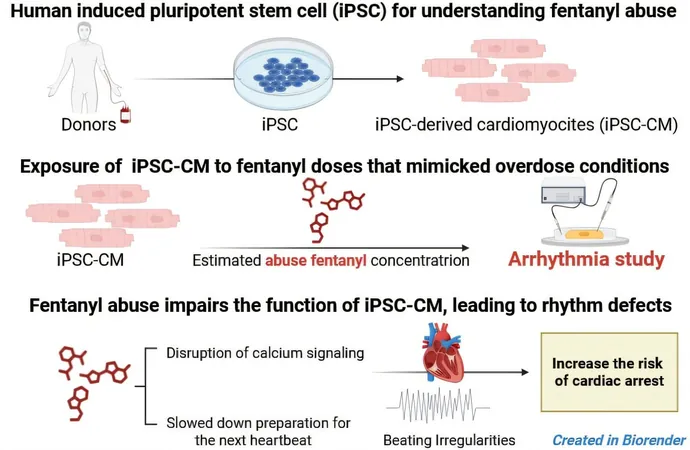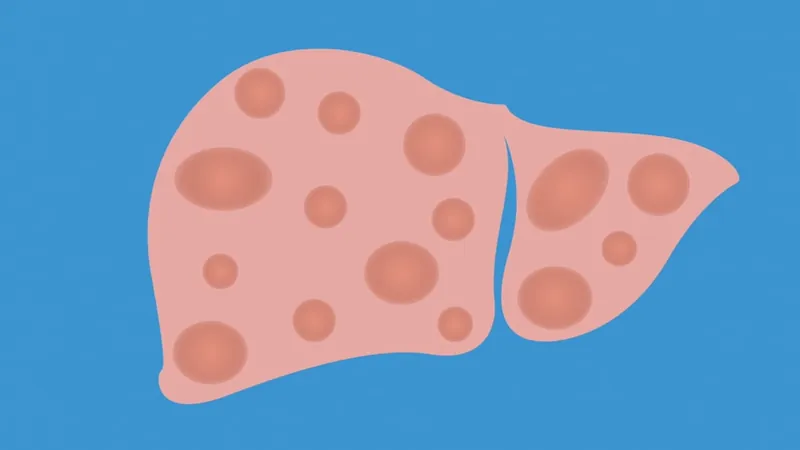
Unlocking the Heart: How iPSC Cells Reveal the Dangers of Fentanyl Abuse
2025-08-28
Author: John Tan
Fentanyl, the potent synthetic opioid that’s 50 to 100 times more powerful than morphine, has been a game changer in the ongoing opioid crisis, driving countless individuals to face its deadly consequences. Among these dangers, one of the most alarming is opioid-induced cardiac arrest, which can occur with fentanyl misuse. But while it’s known that this class of drugs can lead to life-threatening heart rhythms, the specific impacts of fentanyl on cardiac function have remained largely unexplored.
Groundbreaking Research Sheds Light on Fentanyl's Heart Risks
In an eye-opening study featured in the journal *Circulation*, a team led by researcher Gema Mondéjar-Parreño, Ph.D., along with senior author Joseph C. Wu, MD, Ph.D., director of Stanford’s Cardiovascular Institute, has embarked on a groundbreaking journey to understand patient-specific responses to fentanyl abuse using human-induced pluripotent stem cells (iPSCs). These remarkable cells offer unprecedented insight into how opioids affect the heart at an individual level.
What Did the Study Uncover?
The researchers meticulously examined 19 toxicology studies conducted between 1994 and 2022, revealing an alarming trend: the average fentanyl concentration in toxicology cases was three times higher than what is typically found in chronic pain patients. Armed with this data, they exposed heart muscle cells derived from iPSCs to fentanyl levels that mirrored overdose conditions.
The results were striking. Fentanyl disrupted calcium signaling within the heart cells, a critical process for ensuring proper heart rhythm and pumping action. This disturbance not only interfered with the heart’s ability to prepare for the next contraction but also set the stage for irregular heartbeats, known as arrhythmias. Furthermore, the study uncovered an unsettling synergy: when combined with isoproterenol—a stimulant often used to elevate heart rates—the arrhythmias were exacerbated, leading to even greater risks.
A Call to Action Against the Fentanyl Epidemic
As fentanyl continues its devastating campaign across communities, research like this underscores the urgent need for heightened awareness and understanding of its impact on heart health. Unlocking the mysteries of how fentanyl influences heart rhythms could pave the way for more effective interventions and treatments for those caught in the grip of opioid addiction.
This critical study not only enhances our understanding but also solidifies the importance of addressing the broader implications of opioid abuse on cardiovascular health. It’s a wake-up call about the urgent need for targeted strategies to combat this escalating crisis.





 Brasil (PT)
Brasil (PT)
 Canada (EN)
Canada (EN)
 Chile (ES)
Chile (ES)
 Česko (CS)
Česko (CS)
 대한민국 (KO)
대한민국 (KO)
 España (ES)
España (ES)
 France (FR)
France (FR)
 Hong Kong (EN)
Hong Kong (EN)
 Italia (IT)
Italia (IT)
 日本 (JA)
日本 (JA)
 Magyarország (HU)
Magyarország (HU)
 Norge (NO)
Norge (NO)
 Polska (PL)
Polska (PL)
 Schweiz (DE)
Schweiz (DE)
 Singapore (EN)
Singapore (EN)
 Sverige (SV)
Sverige (SV)
 Suomi (FI)
Suomi (FI)
 Türkiye (TR)
Türkiye (TR)
 الإمارات العربية المتحدة (AR)
الإمارات العربية المتحدة (AR)